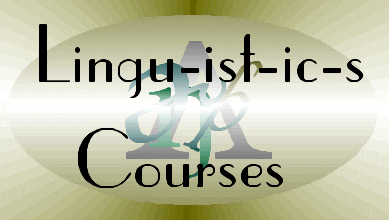

DB: LN 105, LN 110
LN 105. Linguistic Analysis: Sounds and Words (I or II; 3, 0: U). One
semester of a two-semester introduction to the study of language. Topics include
phonetics, phonology, word formation, language processing and acquisition, historical
linguistics. LN 105 and LN 110 many be taken in either order.
LN 110. Linguistic Analysis: Sentences and Meaning (I or II; 3, 0: U).
One semester of a two-semester introduction to the study of language. Topics
include syntax, semantics, areal, social, and professional dialects, and sociolinguistics.
LN 105 and LN 110 many be taken in either order.
LN 205. Phonetics and Phonology (II or II; 3, 0: K). Description, pronunciation, and transcription of human speech sounds. Patterns and functions of these sounds in language. Prerequisite: LN 105 or 110.
LN 210. Morphology and Lexicology (I or II; 3, 0, K). The derivation and use of words in sentences. This course explores the idea the "words" do not exist, but that more intriguing elements do. Biological, psychological, and neurological evidence is explored. Prerequisite: LN 105 or 110.
LN 215. Syntax and Semantics (I or II; 3, 0, K). Contemporary generative theories of phrase structure and how it expresses meaning. Linguistic and biological evidence of sentences and how children learn how to build sentences without ever being taught. Prerequisite: LN 105 or 110.
LN 220. Historical Linguistics (I or II; 3, 0; U). Change and growth in natural languages. Methods of comparative reconstruction of proto-languages from contemporary languages.
LN 241. Teaching Foreign Language (I, first 5 weeks; 10, 0; U) The objectives, materials, and methods of teaching foreign language skills. Prerequisite: LN 105 or 110.
LN 265 Language Acquisition. The linguistic and psycholinguistic study of how children acquire language unconsciously, without being taught, between the ages of 2 and 5. Language development in early childhood. Field trips to local day-care centers.
LN 295 Topics in Linguistics (I or II; R; 3, 0; K) A specific linguistic topic to be selected. Prerequisite: LN 105, LN 110, or permission of the instructor. May be repeated for credit.
LN 390 Independent Study. Subject to be selected by the student in consultation with the instructor. May be repeated for credit. Prerequisite: permission by the instructor.
![]() hile there is currently no major in linguistics, interdepartmental majors including linguistics and related disciplines are encouraged. Guidelines and suggestions are available from the program director. Students planning graduate work in speech therapy, speech pathology, cognitive psychology, or linguistics are recommended to take several linguistics courses before graduation. A minor in linguistics is available with the approval of the program director. Courses toward the minor may include the history and structure courses at the end of the course list.
hile there is currently no major in linguistics, interdepartmental majors including linguistics and related disciplines are encouraged. Guidelines and suggestions are available from the program director. Students planning graduate work in speech therapy, speech pathology, cognitive psychology, or linguistics are recommended to take several linguistics courses before graduation. A minor in linguistics is available with the approval of the program director. Courses toward the minor may include the history and structure courses at the end of the course list.
Language history and structure courses: EN 295 (The History of the English Language); EN 296 (The Languages of Literature); Fr 342 (Analysis of the French Language); FR 344 (History of the French Language); RU 301 (Russian Grammar); SP 340 (Structure and History of the Spanish Language).
![]()
![]()
![]()
![]()
![]()
![]()
![]()
![]()
![]()